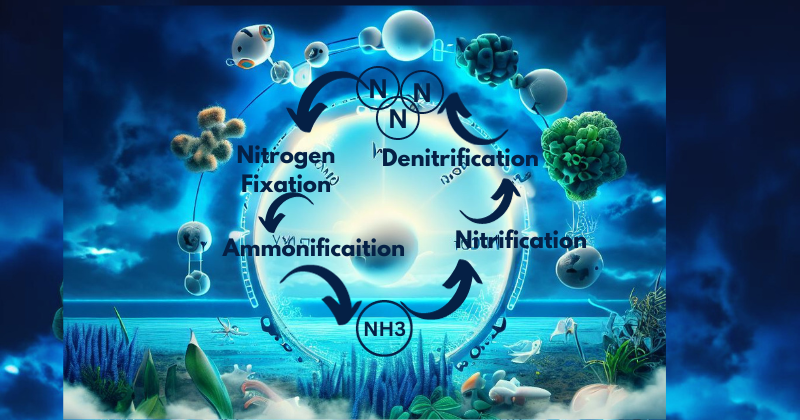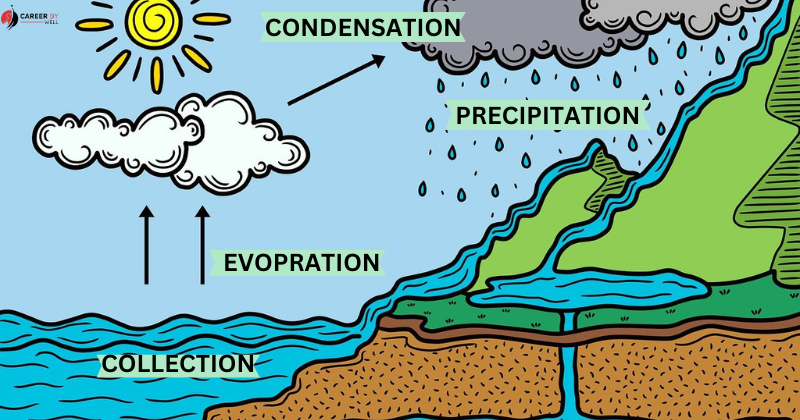The nitrogen cycle is essential for maintaining the fertility of soils, supporting plant growth, and sustaining ecosystems.
The nitrogen cycle is a crucial biogeochemical cycle that describes the movement and transformation of nitrogen in various forms within the Earth’s ecosystems.
Nitrogen is essential for life because it comprises amino acids, proteins, nucleic acids (DNA and RNA), and other vital biomolecules.
The nitrogen cycle encompasses several processes and stages that allow nitrogen to be cycled through the atmosphere, soil, water, and living organisms.
Generally, there are six stages of the nitrogen cycle.
- Nitrogen Fixation
- Assimilation
- Ammonification
- Nitrification
- Denitrification
- Nitrogen Losses
Nitrogen Fixation:
The majority of the Earth’s atmosphere, approximately 78%, comprises molecular nitrogen (N2), which consists of two nitrogen atoms bonded together.
Nitrogen fixation is the process by which nitrogen-fixing bacteria convert atmospheric nitrogen (N2) into ammonia (NH3) or related compounds. These bacteria can be free-living in the soil or symbiotic with certain plants (legumes) or cyanobacteria.
Human activities, such as industrial processes, can also fix nitrogen.
Assimilation:
Plants absorb ammonia (NH3) and other forms of nitrogen from the soil, primarily in the form of ammonium ions (NH4+) or nitrate ions (NO3-).
When animals consume plants (herbivores) or other animals (carnivores), they assimilate the nitrogen compounds in their diet, incorporating them into their proteins and biomolecules.
Ammonification:
When plants and animals die, decomposers (bacteria and fungi) break down their organic matter, releasing nitrogen compounds, such as ammonia (NH3), in a process known as ammonification.
Nitrification:
Nitrification is a two-step process where certain bacteria convert ammonium ions (NH4+) into nitrite ions (NO2-).
While another group of bacteria further oxidizes nitrite ions (NO2-) into nitrate ions (NO3-). Nitrate is a form of nitrogen that plants can readily absorb and use.
Denitrification:
Denitrifying bacteria convert nitrate ions (NO3-) into nitrogen gas (N2) or nitrous oxide (N2O), which is then released into the atmosphere. This process helps return nitrogen to the atmosphere, completing the cycle.
Nitrogen Losses:
Excess nitrates can be lost from the soil through leaching, entering groundwater and potentially contaminating drinking water sources. Ammonia (NH3) can be released into the atmosphere through volatilization, contributing to air pollution.
Human Impacts:
Human activities, particularly synthetic fertilizers in agriculture, have significantly altered the nitrogen cycle by adding excess nitrogen to ecosystems.
Industrial activities, such as producing nitrogen-based chemicals and emissions from combustion processes, contribute to nitrogen pollution.
Excess nitrogen in water bodies can lead to water pollution, harmful algal blooms, and oxygen depletion in aquatic ecosystems, impacting fish and other aquatic life.
The nitrogen cycle is essential for maintaining the fertility of soils, supporting plant growth, and sustaining ecosystems.
However, human activities have disrupted this cycle by introducing excess nitrogen into the environment, leading to environmental challenges such as water pollution and nitrogen deposition.
Sustainable nitrogen management practices are essential for minimizing these impacts and preserving ecosystem health.
Importance Of Nitrogen Cycle
The nitrogen cycle is paramount to life on Earth and the functioning of ecosystems. It describes the continuous movement and transformation of nitrogen in various forms within the Earth’s ecosystems, from the atmosphere to the land and water.
Essential Nutrient:
Nitrogen is an essential element for all living organisms. It is a critical component of amino acids, proteins, nucleic acids (DNA and RNA), vitamins, and other biomolecules.
Without an adequate supply of nitrogen, life as we know it would not be possible.
Supports Plant Growth:
Nitrogen is a primary nutrient required for plant growth. It is a key component of chlorophyll, which is essential for photosynthesis.
Nitrogen fertilizers are widely used in agriculture to enhance crop yields and food production, helping to feed the world’s population.
Ecosystem Health:
The nitrogen cycle is vital for maintaining the health and vitality of terrestrial and aquatic ecosystems.
Nitrogen is a limiting nutrient in many ecosystems, meaning that its availability can control the rate of primary production (e.g., plant growth) and the entire food web.
Atmosphere-Soil Exchange:
Nitrogen is continuously exchanged between the atmosphere and the soil. N2) makes up most of Earth’s atmosphere, but most plants cannot directly use N2.
Nitrogen-fixing bacteria in the soil convert N2 into ammonia (NH3) and related compounds that plants can absorb.
Natural Nitrogen Fixation:
Nitrogen-fixing bacteria, both free-living and symbiotic with certain plants (e.g., legumes), are crucial in converting atmospheric nitrogen into usable plant forms.
This natural process is essential for maintaining soil fertility.
Human Impact:
Human activities, including the use of synthetic fertilizers and the burning of fossil fuels, have significantly altered the nitrogen cycle.
These activities add excess nitrogen to ecosystems. This can boost crop yields. Besides, it can also lead to environmental issues such as water pollution and the disruption of natural ecosystems.
Water Quality:
Excess nitrogen in water bodies can cause water pollution and harm aquatic ecosystems. High levels of nitrogen can lead to eutrophication.
It is a process in which excessive nutrients cause the overgrowth of algae, leading to oxygen depletion and harm to fish and other aquatic life.
Global Climate System:
The nitrogen cycle interacts with other biogeochemical cycles, such as the carbon cycle and the phosphorus cycle. These interactions influence atmospheric chemistry, climate patterns, and the atmosphere’s composition.
Biodiversity:
The nitrogen cycle supports the diversity of life on Earth. It provides the necessary nutrients for the growth of plants and the subsequent availability of food and habitats for a wide range of species.
Human Nutrition:
Nitrogen is a fundamental component of dietary protein. Adequate nitrogen intake is crucial for human health, growth, and development.
Final Thoughts
In summary, the nitrogen cycle is a foundational Earth system process. It influences the growth of plants, the health of ecosystems, water quality, and human nutrition.
It is essential for sustaining life on Earth and for addressing environmental challenges associated with human activities. Understanding and managing the nitrogen cycle is critical for maintaining a balanced and healthy planet.

